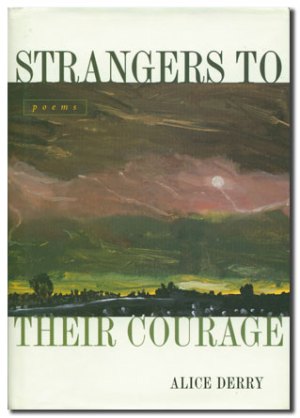Strangers to Their Courage

A week before planes were driven into the New York Trade Towers, Strangers to their Courage appeared from Louisiana State University Press. The book is no stranger to atrocity. After the poems in Clearwater found their home, I realized another manuscript was already waiting, one I had been writing in secret for years. The poems centered on the stories of people I had listened to only reluctantly, whose hands pressing on my arm forced me to listen. Little has changed in the years since the book’s publication, a testimony to the world’s stubborn belief that around the German people hovers an evil the rest of us don’t share. What I hear are more stories, as the German-American listeners at my readings tell me that the book is giving them a kind of permission to talk.
The book’s cover copy reads: “In this startling collection of poetry, Alice Derry contemplates an awkward, even taboo, subject—the persecution and suffering of the German population before, during, and after World War II. Sparked by her desire to capture in verse the torment of her German cousins. . . .Derry composed these poems over a quarter century, ultimately chronicling the anguish of an entire people who “deserved” their lot, a people permanently tainted by the horrifying events of the Third Reich and the Holocaust.”
The poems, in two sections, transform stories I learned from my cousins and the many stories I heard from others, as if my spending a year in Germany when I was twenty came about so I could learn to listen. The poems are preceded by an essay in which I take my stand against genocide and hypocrisy. Family and relationships are still the focus of my writing; here they take place on the world’s stage.
Praise for Strangers to Their Courage
“Derry has a poet’s ear. The stories of hardship and pain . . . are distilled into spare, unstinting verse . . . . this is tough stuff, but beautifully rendered.” Mary Ann Gwinn of The Seattle Times.
“With clear prose and evocative poetry, Alice Derry has crafted a challenging book—a must-read for all concerned with the issues of human brutality and atonement.” ─Linda Bierds
Cover Art
Cover art is The Balloon Has a Night on the Town, by Josie Gray, Irish painter, County Sligo, gauche painting
Availability
Out of print. Available through online book retailers such as abebooks.com.
Excerpt from from Strangers to their Courage
He Grew Up West of Innsbruck
In the bundle we all carry from childhood,
his contained this:
His father, S.A., S.S., Stalingrad, Siberia.
His father’s last letter to him came in ’53.
Fathers gone, fourteen cousins
and their mothers lived in one house.
He was six that day at the dentist’s. Sirens.
B-17’s all over. Four days before he got home.
Starvation began in the winter of ’44.
’45, ’46, ’47. They stayed alive on dogfood.
His grandfather stole it at the officers’ club.
He remembers being full about once a week.
When the Russians came, an aunt and uncle
were rolled away in the boxcars. No letters at all.
Neither his father nor his mother “knew about the camps.”
They knew their Jewish neighbor, knew his Protestant wife
who wouldn’t sign papers for their two sons in the S.S.
The sons never returned.
Under the fluorescent lights of my classroom, all eyes
on him, he’s struggling to untie the knots.
He’s brought his grandfather’s helmet
from World War I, brigadier general,
and he holds what it should mean
with what history has made clear to him,
whatever of Austria was handed to Italy in 1919,
things went way beyond payback.
As he works his sweaty wad of stories, students begin
to ask, “Why wouldn’t she sign the papers?”
“How old were the sons?” He’s still his skinny self
fighting with cousins over dogfood.
“My uncles smuggled people into Switzerland.”
“My aunt married a Jew and saved him from Dachau,”
he recites, and it’s not exactly that he thinks
they haven’t accepted his justification.
He’s not really listening, possibility being
the bright flame of hope, fact, its abandonment.
His father didn’t crawl back. His body
wasn’t returned—the place where grief is.
His mother could cross into his stepfather’s shadow.
For him, the ceaseless running ahead,
days withdrawing into the future
like perspective in the paintings of the 1400s.
Illusion. He wakes and sleeps and wakes for months,
years even, then watches a man
lift his small son into a car and feels that stretch
underneath the arms, careless closeness.
The hour is over. Carefully he folds his bundle.
He’s the one who has to carry it.